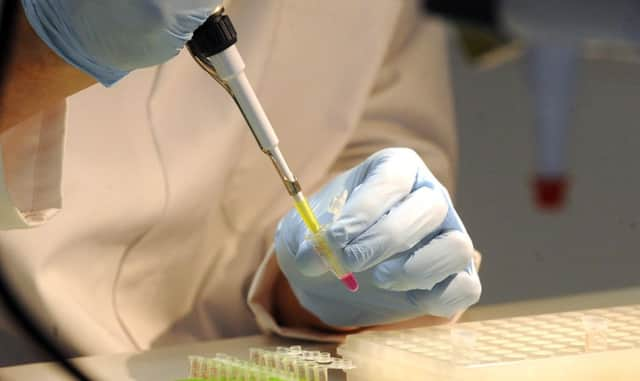Stem cell injection could mend broken hearts


Work has been done over the past ten years on so-called regenerative medicine, using stem cells isolated from the heart, which have demonstrated the potential to encourage the heart to repair itself.
Scientists from Imperial College London, led by the British Heart Foundation’s (BHF) Professor Michael Schneider and Dr Michela Noseda, have pinpointed a particular type of stem cell which helped to repair and recover damaged heart muscle when tested in mice.
Advertisement
Hide AdAdvertisement
Hide AdThe findings showed that mice treated with these stem cells were able to recover and repair a significant proportion of their damaged heart muscle after 12 weeks, preventing heart failure, when compared with mice who had not received the stem cell treatment.
Prof Schneider, who directed the research published in the journal Nature Communications, said: “We have found stem cells in the heart that have a specific protein – called PDGFRα – on their surface have the greatest potential to repair damaged hearts.
“When we injected stem cells with this protein into damaged hearts, we saw a significant level of heart repair.
“Now that we know which stem cells to use, we want to find their equivalent in human hearts for more efficient heart repair and regeneration after heart attacks. Future treatments could be injections of stem cells, or use of the healing proteins that these cells make.”
The researchers now hope to find a similar cell in human hearts.
During a heart attack, the heart is starved of oxygen and suffers damage that can never be repaired. This damage can lead to heart failure over time, which affects more than half a million people in the UK. Heart failure – when the heart is damaged, becomes weak and cannot pump properly – is a debilitating condition which can be terminal in the most severe cases.
The only cure currently is a heart transplant.
The study comes as the BHF celebrates four years of cutting-edge research into regenerative medicine through its Mending Broken Hearts Appeal.
Professor Jeremy Pearson, BHF associate medical director, said: “This research is an early, but important, step towards understanding how we might be able to encourage stem cells in failing hearts to repair the damage caused by a heart attack.
Advertisement
Hide AdAdvertisement
Hide Ad“It represents one of the many ways in which scientists funded by our Mending Broken Hearts Appeal are approaching the problem of heart regeneration.
“A crucial next step for this research will be to establish if the human heart has similar heart-repairing stem cells to those pinpointed by this method in mice.”
Experts have warned that the findings should be handled cautiously but praised the “cutting edge” science behind the study.
Professor Colin Berry, professor of Cardiology and Imaging at Glasgow University’s Institute of Cardiovascular and Medical Sciences, said: “It seems to me that this is interesting information but it is still far removed from what is relevant to patients.
“It is important science and cutting-edge stuff but there is so much more that needs to be done.”